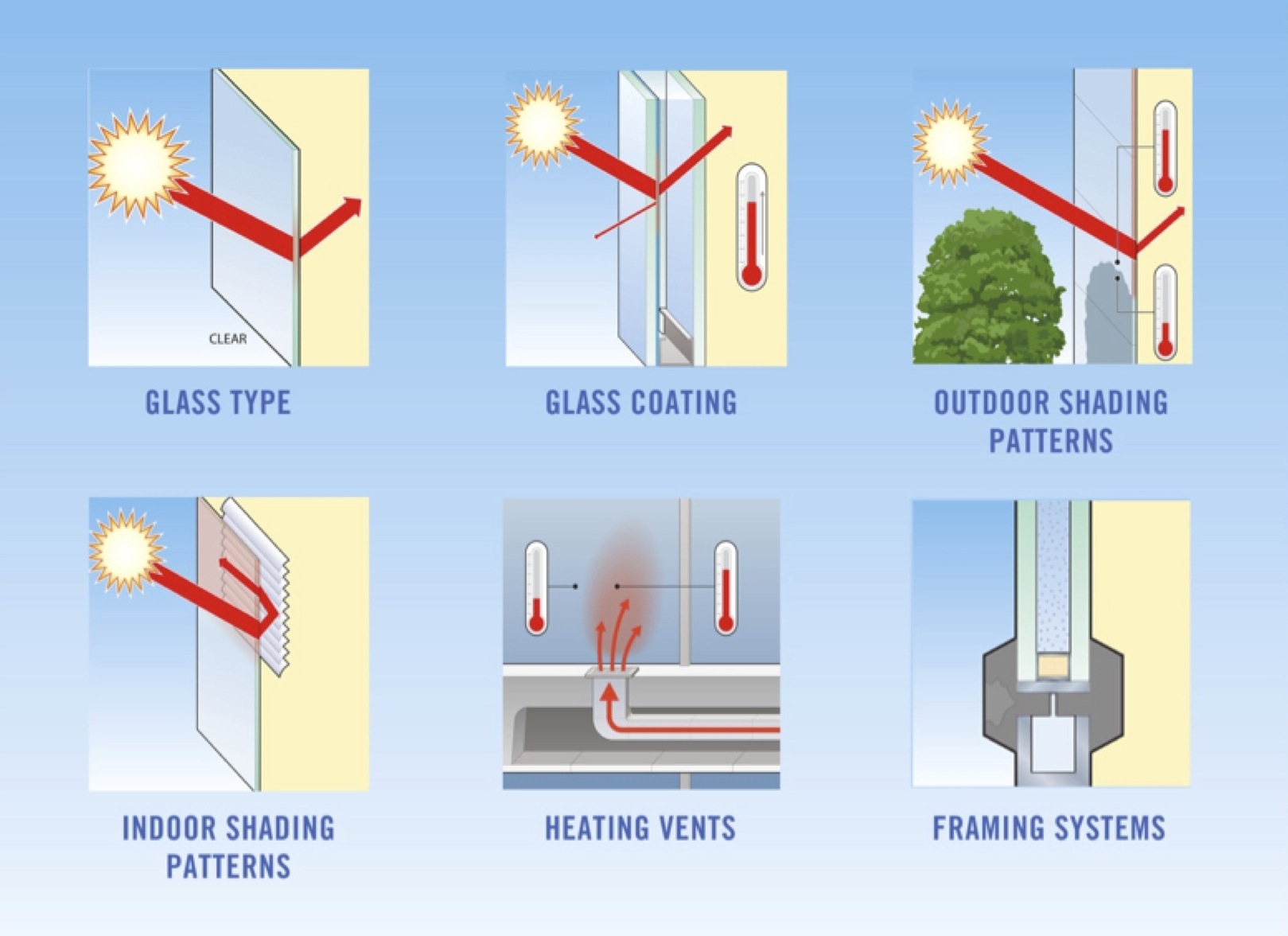Thermal stress is one of many factors that can cause glass to break, even when it is not impacted by a projectile.
Such failures usually are not a testament to the quality of the glass, but rather the result of temperature imbalance within the glass, which can occur when the center of a window or insulating glass unit (IGU) heats and expands while the edges remain cool.
The resulting thermally induced tensile stress on the glass edges can exceed the strength of the glass itself, causing it to break at approximately a 90-degree angle.
Working closely with the IGU fabricator and glass supplier, and conducting a thermal stress analysis at the beginning of the design phase can help architects specify the proper glass for their projects. Here are five thermal stress related rules-of-thumb to consider when specifying glass:
1. Clear or color? Glass can be clear, ultra-clear or tinted in colors such as gray, blue, green and bronze. Tinted glasses absorb solar radiation more than clear glass, which can cause them to collect heat and make them more susceptible to break from thermal stress.
2. Inner or outer surface? Reflective and low-emissivity (low-e) coatings, which improve the solar performance of glass primarily by reflecting solar radiation, can be placed on any one of four surfaces in a dual-pane IGU. While they are usually placed on the inner glass surfaces of the IGU, the coating orientation and the associated risk of thermal stress has to be taken into account.
3. Sunny or shady? Outdoor shading, including overhangs, adjacent buildings, and trees, is one of the most dynamic elements to consider when analyzing thermal stress. Minimizing locations where non-uniform shading of IGUs can occur will help avoid extreme temperature gradients. Interior shading devices, such as blinds or drapes, can increase glass temperature by reflecting solar radiation back through the glass or by reducing the convection and conduction of heat away from the glass. To minimize thermally induced edge stress, the air space around the window glass should be ventilated. There should be a gap of several inches between the glass and shades, blinds or drapes.
4. Where to place a vent? If heating vents, registers and grilles point directly at glass units, warm air will cause the glass to heat up and, under certain conditions, break. Make sure vents are carefully placed to reduce thermal stress risk and avoid placing them between the glass and interior shading devices.
5. How to frame it? Glass framing systems that have low heat capacity also can minimize the chance of a thermal stress break. Structural gaskets and narrow metal framing are favorable because they have less effect on the glass temperature around the edges. Conversely, massive framing – whether metal, masonry or even wood – can have more of an effect, resulting in thermal imbalance and risk of glass breakage.
To learn more about avoiding thermal breakage of insulated glass units and other glass-related topics, visit the PPG Glass Education Center at www.educationcenter.ppg.com.
Related Stories
| Aug 11, 2010
High-profit design firms invest in in-house training
Forty-three percent of high-profit architecture, engineering, and environmental consulting firms have in-house training staff, according to a study by ZweigWhite. The 2008-2009 Successful Firm Survey reports that only 36% of firms overall have in-house training staff. In addition, 52% of high-profit firms use an online training system or service.
| Aug 11, 2010
Help Wanted: Architect for $100 million 'Discovery Park' in Union City, Tennessee
The Robert E. and Jenny D. Kirkland Foundation is identifying architects interested in designing a 50-acre, multi-million dollar complex in Union City, TN. Discovery Park of America will be a world-class, multi-faceted venue presenting exhibits and interactive experiences about history, nature, art, and science.
| Aug 11, 2010
Report: Fraud levels fall for construction industry, but companies still losing $6.4 million on average
The global construction, engineering and infrastructure industry saw a significant decline in fraud activity with companies losing an average of $6.4 million over the last three years, according to the latest edition of the Kroll Annual Global Fraud Report, released today at the Association of Corporate Counsel’s 2009 Annual Meeting in Boston. This new figure represents less than half of last year’s amount of $14.2 million.
| Aug 11, 2010
AIA to Congress: Act now to jump start building sector of economy
Tampa-based architect, Mickey Jacob, FAIA, unveiled the American Institute of Architects’ (AIA) Rebuild & Renew plan for both short- and long-term economic recovery to the House Committee on Small Business at a hearing October 7th.
| Aug 11, 2010
National Intrepid Center of Excellence tops out at Walter Reed
SmithGroup and The Intrepid Fallen Heroes Fund (IFHF), a non-profit organization supporting the men and women of the United States Armed Forces and their families, celebrated the overall structural completion of the National Intrepid Center of Excellence (NICoE), an advanced facility dedicated to research, diagnosis and treatment of military personnel and veterans suffering from traumatic brain injury.
| Aug 11, 2010
Jacobs, HDR top BD+C's ranking of the nation's 100 largest institutional building design firms
A ranking of the Top 100 Institutional Design Firms based on Building Design+Construction's 2009 Giants 300 survey. For more Giants 300 rankings, visit http://www.BDCnetwork.com/Giants
| Aug 11, 2010
Walt Disney Family Museum planned in San Francisco
Construction is under way on a new museum dedicated to the man behind the Disney empire. Set to open this fall in San Francisco, the Walt Disney Family Museum will feature 10 galleries, starting with Disney's beginnings on a Missouri farm.







